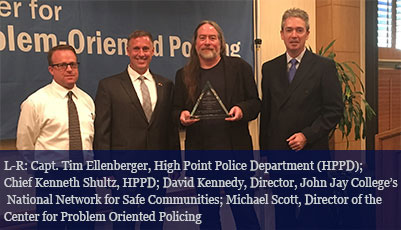
Recognized for Intimate Partner Violence Intervention Developed with the National Network for Safe Communities at John Jay College
November 1, 2016—The Center for Problem-Oriented Policing named the High Point Police Department (North Carolina) the winner of the 2016 Herman Goldstein Award for Excellence in Problem-Oriented Policing for its Intimate Partner Violence Intervention, the groundbreaking approach developed with the National Network for Safe Communities at John Jay College. Announced at the 26th Annual Problem-Oriented Policing Conference in Tempe, Ariz., last week, the Goldstein Award is the premier honor in community and problem-oriented policing.
The Intimate Partner Violence Intervention (IPVI), first implemented in High Point, was designed to transform the response to IPV by shifting the focus to identifying, deterring, and controlling offenders. The High Point Police Department has been working with the National Network for Safe Communities (NNSC) for nearly twenty years, effectively addressing other serious crime problems, including individual violent offenders, group violence, and overt drug markets. Beginning in 2009, High Point police, community members, researchers, and victim advocates worked with NNSC Director David Kennedy and others to design and implement a new approach that would protect the most vulnerable victims of IPV from the most dangerous offenders; remove the burden of preventing IPV from victims; intervene early in the repeat victimization process; make it clear to even low-level offenders that IPV would not be tolerated; and, if necessary, take special action to incapacitate the most dangerous offenders. Over the course of seven years the city has shown consistently positive results. IPV homicides have dropped dramatically, alongside lower recidivism, reduced victim injuries, fewer repeat calls for service, and more positive responses from victims. The Herman Goldstein Award confers new and important recognition on this promising strategy.
"This work has absolutely saved women's lives in High Point," says Kenneth Shultz, chief of the High Point Police Department. "It has not only allowed us to hold offenders accountable and take the onus off victims to address their abusers, but also greatly improved out working partnerships with the advocacy community to help keep victim safe from harm. We are honored to be recognized with the Herman Goldstein Award."
“When someone whose name we know is terrorizing and brutalizing someone else whose name we know, we should make him stop,” Kennedy says. “We’ve been utterly failing to do that. For decades we’ve been making women responsible for their own victimization. The hope in this work was that we could do a much better job of protecting the most vulnerable victims. We now have a way to do just that. I’m incredibly grateful to High Point for their deep commitment to this work, and proud to be associated with what they’ve accomplished.”
The NNSC, a project of John Jay College of Criminal Justice in New York City, supports cities implementing proven strategies to reduce violence and improve public safety, minimize arrest and incarceration, and strengthen police-community relations. Kennedy’s work with the Boston Police Department on group-related violence—known widely as “Operation Ceasefire”—earned the 1998 Herman Goldstein Award. His work with High Point Police Department on the Drug Market Intervention—often called the “High Point Model”—was a finalist for the award in 2006. More on the IPVI can be found here. The NNSC and the High Point Police Department are working with the Department of Justice’s Office on Violence against Women on a three-year national replication of the IPVI. For more information, contact the NNSC’s Rachel Teicher at rteicher@jjay.cuny.edu.



